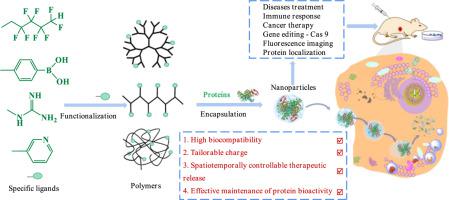Progress in Polymer Science ( IF 26.0 ) Pub Date : 2023-10-01 , DOI: 10.1016/j.progpolymsci.2023.101751 Yuhe Zhang , Jiahao Shi , Bin Ma , Ya-Nan Zhou , Haiyang Yong , Jianzhong Li , Xiangyi Kong , Dezhong Zhou

|
With the growing demand for clinically reliable therapeutics, traditional small molecule drugs are increasingly limited by their short circulation duration, low bioavailability, and poor targeting. Protein drugs, on the other hand, have gained popularity due to their high activity, high specificity, low cytotoxicity, and distinct biological function. Especially, monoclonal antibodies are among the top 10 drugs in global sales. However, protein drugs have limitations such as complex and unstable structure, immune clearance caused by antigen fragments on the surface, and inability to penetrate cell membranes, which severely restrict intracellular delivery. Using carriers can greatly enhance the stability of protein drugs, prevent immune clearance, and facilitate their cellular uptake and cytosolic release. Polymers are commonly used for delivering small molecules, DNA, and RNA. However, developing polymers for protein delivery with high efficiency and low cytotoxicity still faces several challenges, including poor protein binding ability, membrane impermeability, and low endo/lysosomal escape efficiency. Functionalizing polymers with specific components such as fluorine, boron, guanidine, heterocycles, and multicomponents can improve polymer-protein interaction, cell membrane penetration, endo/lysosomal escape, and biocompatibility. This review provides an overview of strategies for polymer functionalization and their effects on protein delivery. It also discusses trends and challenges in developing polymer carriers for protein delivery.
中文翻译:

用于细胞内蛋白质递送的聚合物的功能化
随着对临床可靠治疗药物的需求不断增长,传统小分子药物因其循环持续时间短、生物利用度低和靶向性差而日益受到限制。另一方面,蛋白质药物因其高活性、高特异性、低细胞毒性和独特的生物学功能而受到欢迎。其中单克隆抗体位居全球药品销售额前10位。但蛋白质药物存在结构复杂不稳定、表面抗原片段导致免疫清除、无法穿透细胞膜等局限性,这严重限制了细胞内的传递。使用载体可以大大增强蛋白质药物的稳定性,防止免疫清除,并促进其细胞摄取和胞质释放。聚合物通常用于递送小分子、DNA和 RNA。然而,开发高效、低细胞毒性的蛋白质递送聚合物仍面临一些挑战,包括蛋白质结合能力差、膜不通透性等,以及低内/溶酶体逃逸效率。具有特定组分(例如氟、硼、胍、杂环和多组分)的功能化聚合物可以改善聚合物-蛋白质相互作用、细胞膜渗透、内/溶酶体逃逸和生物相容性。本综述概述了聚合物功能化策略及其对蛋白质递送的影响。它还讨论了开发用于蛋白质递送的聚合物载体的趋势和挑战。






























 京公网安备 11010802027423号
京公网安备 11010802027423号